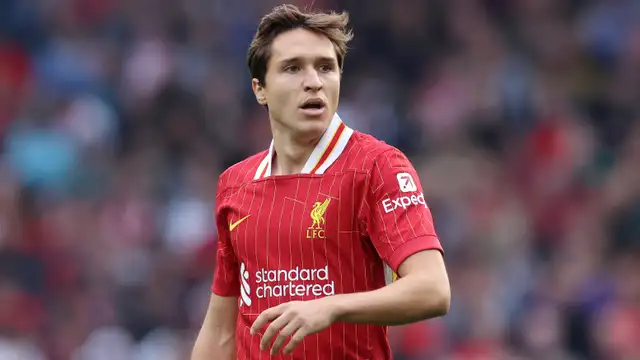
In a recent press conference, Liverpool manager Arne Slot stirred the pot with his candid remarks regarding Federico Chiesa’s absence from the squad. Following a surprising £11 million transfer from Juventus, expectations were high for Chiesa to make an immediate impact at Anfield. However, Slot’s explanation of the player’s current situation has raised eyebrows and ignited debate among fans and pundits alike.
Chiesa, once heralded as one of Serie A’s brightest talents, has faced a series of injuries and inconsistent performances since joining Juventus. His transfer to Liverpool, however, was seen as a golden opportunity for revival. Slot’s statement, I feel sorry for him,indicates a deeper concern than just a tactical gap in the lineup. It hints at the emotional and psychological toll that constant injuries can have on a player’s career.
In the competitive landscape of football, mental health has often been overshadowed by the relentless pursuit of success. Slot’s empathy towards Chiesa suggests an awareness that physical setbacks can lead to a crisis of confidence. He pointed out that “it’s not just about fitness; it’s about feeling right mentally to step onto the pitch.” This perspective is crucial, especially in a sport where the pressure to perform can be immense.
Critics of the transfer have emerged, questioning the wisdom of investing in a player with a history of injuries. Was £11 million a bargain or a gamble? Some analysts argue that Liverpool’s decision might backfire, while others believe that under Slot’s guidance, Chiesa could rediscover his form. This duality reflects a broader discussion in the football community about the risks of signing players with checkered injury records.
Moreover, Slot’s remarks have prompted discussions about player welfare in modern football. The emphasis on physical performance often neglects the psychological aspect, leading to burnout and diminished returns. Chiesa’s situation serves as a reminder of the human element in sports; players are not just assets but individuals facing their battles. As Slot navigates the challenging waters of managing a team, his focus on mental well-being may pave the way for a more compassionate approach to player management.
The reactions from Liverpool fans have been mixed. Some appreciate Slot’s empathy, recognizing that understanding a player’s struggles can foster a supportive environment. Others, however, express frustration, suggesting that the club cannot afford to be sympathetic when the points are at stake. The balance between compassion and competitiveness is a tightrope that Slot must walk as he aims to instill a winning mentality in his squad.
As Liverpool continues to grapple with its identity under new management, the question remains: how will Chiesa’s absence affect the team’s performance? Slot has hinted at exploring different formations and player roles to compensate, but the success of these adjustments will depend largely on the rest of the squad stepping up in Chiesa’s absence.
The narrative surrounding Chiesa also intersects with broader trends in football. The recent rise in awareness around mental health has led clubs to invest more in psychological support for players. Liverpool’s approach, influenced by Slot’s leadership, may reflect a shift towards prioritizing holistic player development over merely securing immediate results.
As the season progresses, eyes will remain glued to Chiesa’s recovery and potential return to form. The hope is that with the right support—both physical and mental—he can reclaim his place as a vital cog in the Liverpool machine. Meanwhile, Slot’s acknowledgment of the challenges faced by players like Chiesa may inspire a more compassionate culture within the club, one that values mental health as much as physical prowess.
In conclusion, Arne Slot’s comments about Federico Chiesa’s absence reveal not only the complexities of player management in football but also a growing recognition of the need for empathy in the sport. As Liverpool strives for success, balancing competitiveness with compassion may ultimately define their season—and potentially reshape the narrative surrounding player welfare in football. Whether Chiesa can rise from this challenging phase will be a story worth following, as the football world watches with bated breath.




